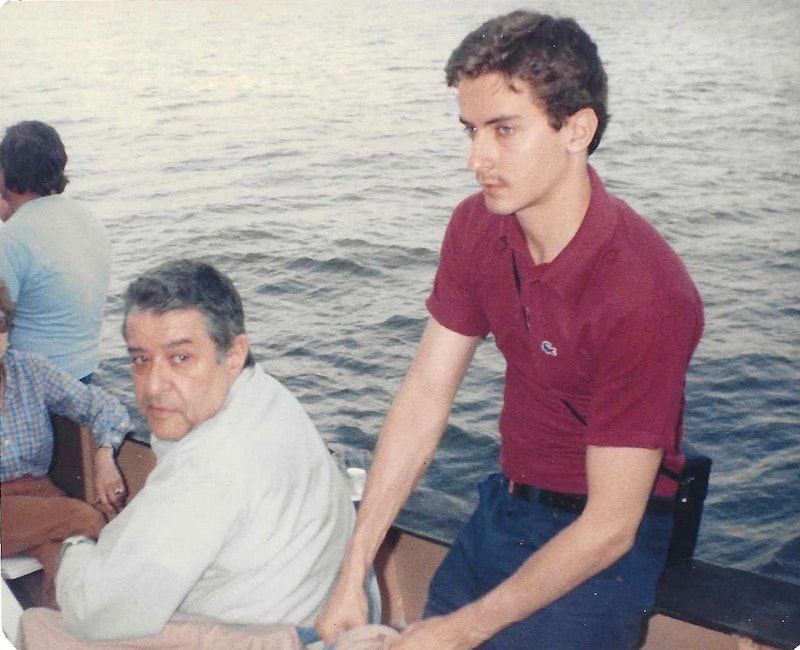I remember buying a copy of Gung Ho! magazine sometime in the late-1970s or early-1980s. These were my teenage years. Gung Ho! was one of various war-enthusiast magazines that followed the success of Soldier of Fortune, and which proliferated after the fall of Saigon. But whereas Soldier of Fortune had the cachet of attracting real mercenaries, some of whom placed ads for their services, Gung Ho! was striving to live up to its tagline, “The Magazine for the International Military Man.” My father looked at this crude, bloody-minded publication and said he’d rather I read pornography.
Bullying—which I experienced mostly as a victim but sometimes as a perpetrator—fed my aspiration for toughness, which found role models such as Clint Eastwood in Escape from Alcatraz; Christopher Walken in The Dogs of War; and G. Gordon Liddy in his autobiography Will, with its tales of rat-eating and arm-burning. My fascination with the mob came and went early; I read Killer: The Autobiography of a Mafia Hit Man, by “Joey,” when I wasn’t yet a teen. I remember the back cover’s wording: “There are three things you need to kill a man: the gun, the bullet, and the balls.”
The desire to be tough helped shape my incipient political conservatism, segueing with tough-on-crime sentiment but even more so with the hawkishness in foreign policy I imbibed from William Safire, Norman Podhoretz and others. At the same time, my growing interest in politics was likely a positive development, channeling impulses that might’ve taken a nastier form elsewhere. I became more interested in polemical exchanges than in any fistfight. In the 1980s, as now, there was an ideological gender gap where men were more likely than women to be attracted to the right; however, unlike today, the Republicans had an edge with college-educated voters.
Still, my growing affinity for science, spurred by Carl Sagan’s 1980 book and TV series Cosmos, had tensions with my emerging politics. Sagan campaigned against the nuclear arms race, whereas I worried about the “window of vulnerability” where the Soviets theoretically could destroy U.S. land-based missiles in a first strike. In college, a left-wing writing professor once asked me why the U.S. couldn’t just rely on its submarine-based missiles, but I wasn’t willing to narrow the deterrent down like that.National security was my primary interest in politics, though economics became a focus as well, my free-market stance also holding some ideal of toughness, albeit more subtly.
There were early hints of culture war, which didn’t appeal to me. I was nonplussed once at an ad in National Review, probably from a conservative book club, that said something about “the pagan appeal of Carl Sagan.” My own religious beliefs, which had included a period of reading an apocalyptic magazine, faded in high school; it would only be much later, in middle age, that I’d become a churchgoer. A dislike for right-wing polemics against “paganism” stayed with me, though, recently manifesting in a letter I wrote to Commentary about an insipid article the magazine ran on that subject.
Though nominally Lutheran, I’d more familiarity with Jewish or Catholic services. I attended seders and bar mitzvahs with relatives and friends, and on trips to the Caribbean I was at some Catholic events with a Puerto Rican family I knew through my father’s import-export work. Puerto Rico was my home away from home, which I visited about once a year when I was in middle school and high school. From Puerto Rico, I’d tag along on our friends’ 46-foot fishing boat, typically eastward to the nearby islands of Culebra and Vieques and then onward to the Virgin Islands.
One year, we boated westward to the Dominican Republic, stopping on the way at Isla de Mona, part of the Puerto Rican archipelago. It’s inhabited only by a few rangers or scientists. When I was packing for trips, my father often advised me to pack light, as I was “not going to a wilderness,” but in this case, he said, Isla de Mona is a wilderness. On an all-but-empty beach there, I gazed dreamily at a blonde woman in khaki shorts. She was a few years older than me, and saw me looking. She walked by and said “Hola” in an American accent, presuming I was Puerto Rican. I said “Hola,” but never found out who she was.
—Kenneth Silber is author of In DeWitt’s Footsteps: Seeing History on the Erie Canal and posts at Post.News.

